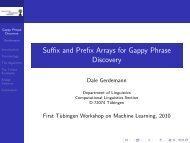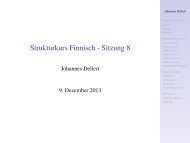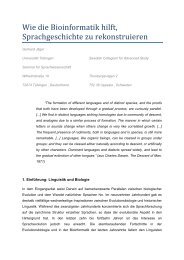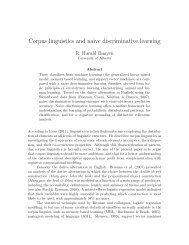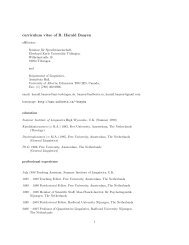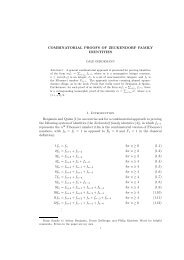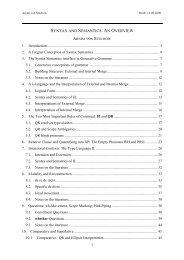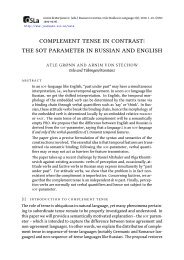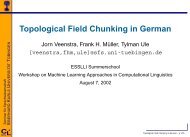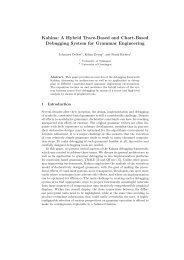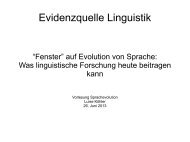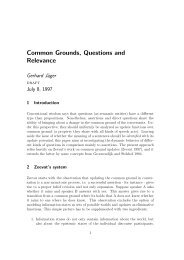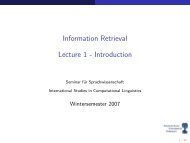A Treebank-based Investigation of IPP-triggering Verbs in Dutch
A Treebank-based Investigation of IPP-triggering Verbs in Dutch
A Treebank-based Investigation of IPP-triggering Verbs in Dutch
You also want an ePaper? Increase the reach of your titles
YUMPU automatically turns print PDFs into web optimized ePapers that Google loves.
fully disambiguate the parse forest for a sentence. Given that we set a limit <strong>of</strong> 500<br />
candidate read<strong>in</strong>gs per sentence, full disambiguation <strong>of</strong> a newly parsed sentence<br />
averages no more than 9 decisions, which enables a careful annotator to susta<strong>in</strong> a<br />
treebank<strong>in</strong>g rate <strong>of</strong> 30 to 50 sentences per hour on the first pass through the corpus.<br />
Error analysis Dur<strong>in</strong>g the course <strong>of</strong> this annotation effort, several annotators<br />
have been tra<strong>in</strong>ed and assigned to carry out the <strong>in</strong>itial treebank<strong>in</strong>g <strong>of</strong> portions <strong>of</strong><br />
the WSJ corpus, with most sections s<strong>in</strong>gly annotated. On successive passes through<br />
the treebank, two types <strong>of</strong> errors are identified and dealt with: mistakes or <strong>in</strong>consistencies<br />
<strong>of</strong> annotation, and shortcom<strong>in</strong>gs <strong>of</strong> the grammar such that the desired<br />
analysis for a given sentence was not yet available <strong>in</strong> the parse forest. Errors <strong>in</strong> annotation<br />
<strong>in</strong>clude mistakes <strong>in</strong> constituent boundaries, <strong>in</strong> lexical choice such as verb<br />
valency or even basic part <strong>of</strong> speech, and <strong>in</strong> phrasal structures such as the level<br />
<strong>of</strong> attachment <strong>of</strong> modifiers or the group<strong>in</strong>g <strong>of</strong> conjuncts <strong>in</strong> a coord<strong>in</strong>ated phrase.<br />
Our calculation <strong>of</strong> the <strong>in</strong>ter-annotator agreeemnt us<strong>in</strong>g the Cohen’s KAPPA[5] on<br />
the constituents <strong>of</strong> the derivation trees after the <strong>in</strong>itial round <strong>of</strong> treebank<strong>in</strong>g shows<br />
a moderate agreement level at κ = 0.6. Such disagreeements are identified for<br />
correction both by systematic review <strong>of</strong> the recorded ‘correct’ trees section by section,<br />
and by search<strong>in</strong>g through the treebank for specific identifiers <strong>of</strong> constructions<br />
or lexical entries known to be relatively rare <strong>in</strong> the WSJ, such as the rules admitt<strong>in</strong>g<br />
questions or imperative clauses.<br />
Shortcom<strong>in</strong>gs <strong>of</strong> the grammar are identified by exam<strong>in</strong><strong>in</strong>g sentences for which<br />
annotators did not record a correct analysis, either because no analysis was assigned,<br />
or because all <strong>of</strong> the top 500 candidate analyses were flawed. Some <strong>of</strong><br />
the sources <strong>of</strong> error emerge quickly from even cursory analysis, such as the <strong>in</strong>itial<br />
absence <strong>of</strong> a correct treatment <strong>in</strong> the ERG for measure phrases used as verbal<br />
modifiers, which are frequent <strong>in</strong> the WSJ corpus, as <strong>in</strong> the <strong>in</strong>dex rose 20 po<strong>in</strong>ts or<br />
the market fell 14%. Other types <strong>of</strong> errors required more detailed analysis, such as<br />
miss<strong>in</strong>g lexical entries for some nouns tak<strong>in</strong>g verbal complements, as <strong>in</strong> the news<br />
that Smith was hired or the temptation to spend the money. These f<strong>in</strong>e-gra<strong>in</strong>ed lexical<br />
entries are not correctly predicted on the fly us<strong>in</strong>g the part-<strong>of</strong>-speech tagger,<br />
and hence must be added to the 35,000-entry manually supplied lexicon <strong>in</strong> the ERG.<br />
Grammar & <strong>Treebank</strong> Update While grammar development proceeds <strong>in</strong>dependent<br />
<strong>of</strong> the <strong>in</strong>itial treebank annotation process, we have periodically <strong>in</strong>corporated<br />
improvements to the grammar <strong>in</strong>to the treebank annotation cycle. When a<br />
grammar update is <strong>in</strong>corporated, the treebank also gets updated accord<strong>in</strong>gly by (i)<br />
pars<strong>in</strong>g anew all <strong>of</strong> the sentences <strong>in</strong> the corpus us<strong>in</strong>g the new grammar; (ii) reapply<strong>in</strong>g<br />
the recorded annotation decisions; and (iii) annotat<strong>in</strong>g those sentences<br />
which are not fully disambiguated after step ii, either because new ambiguity was<br />
<strong>in</strong>troduced by the grammar changes, or because a sentence which previously failed<br />
score assigned, so the annotation can be reviewed <strong>in</strong> a later cycle <strong>of</strong> updates.<br />
88



